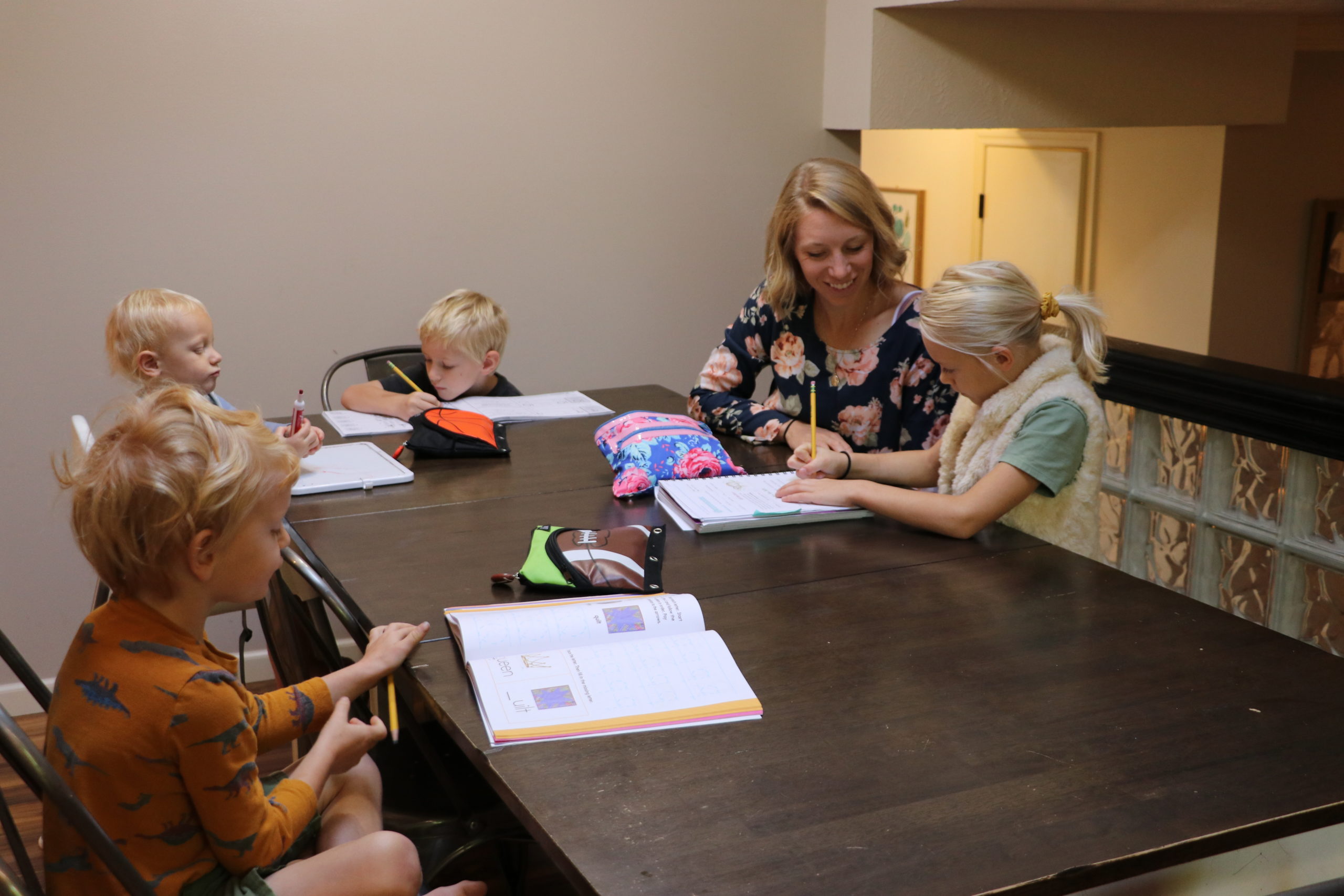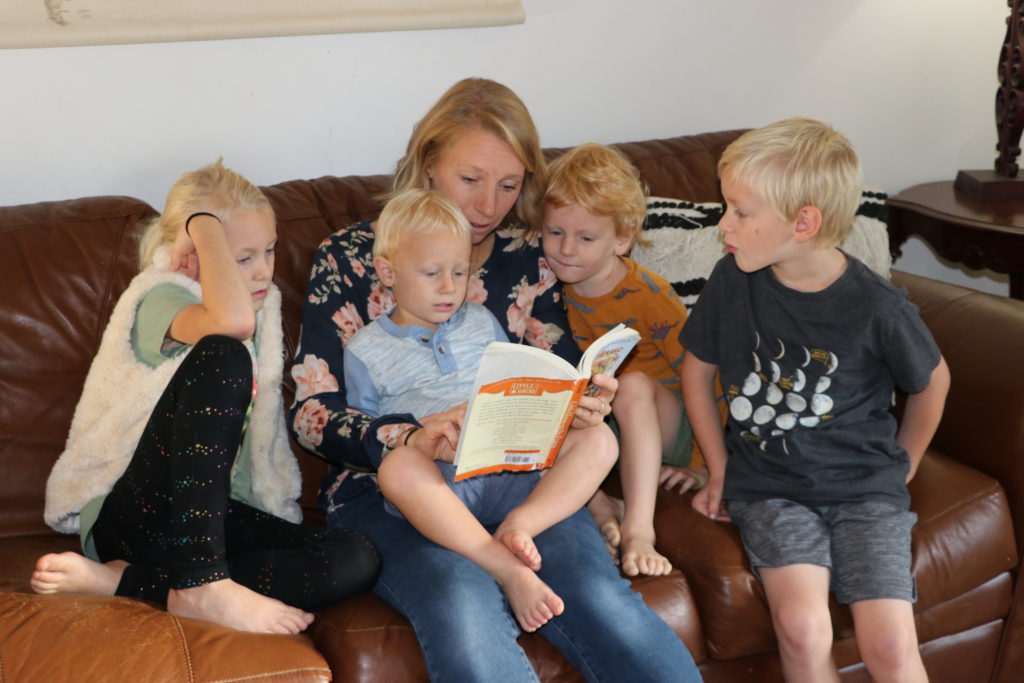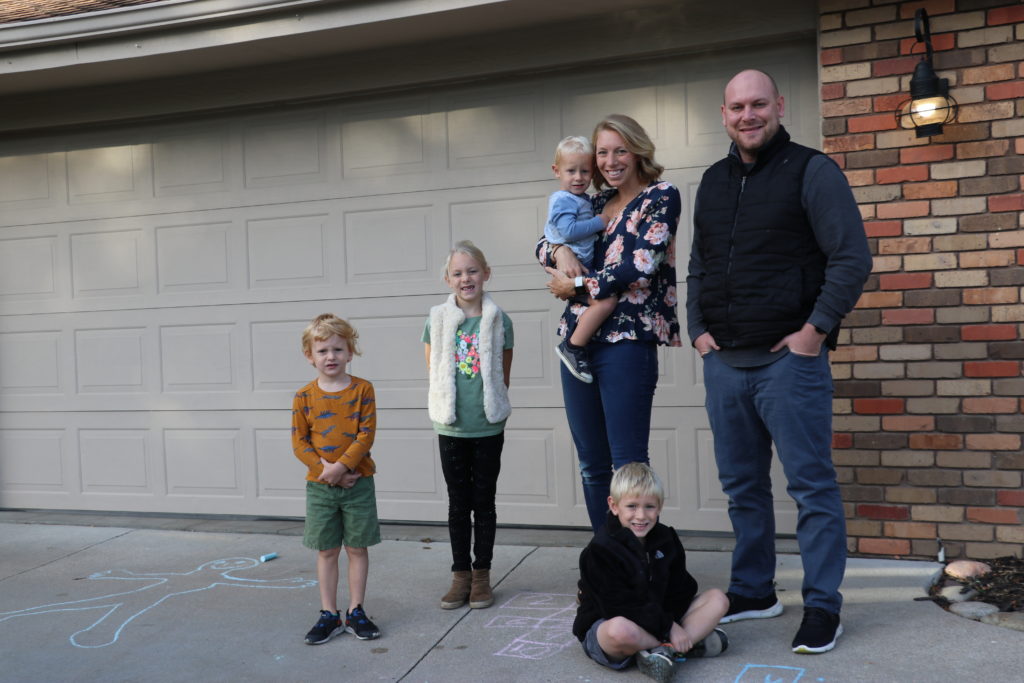
While second-grader Zellie, 7, right, and kindergartner Blaise, 5, left, are officially enrolled in homeschool, Liz Maly uses their workbook time to provide early learning opportunities for the youngest two children, Vitus, 4, and Maximus, 1. The Omaha mom said it’s a double win because they are occupied and developing skills that will help when they are old enough for school. ELIZABETH WELLS
News
Pandemic leads to homeschooling increase for Catholics, others
October 15, 2020
Melissa and Steve Lind had considered homeschooling before, but the coronavirus pandemic made it a reality.
“I’d felt called to it for years, but the virus was the impetus I needed to take action and also allowed my husband to feel comfortable with us doing this,” Melissa told the Catholic Voice.
The pandemic “seemed to normalize it more in a world that really can stigmatize homeschooling as ‘weird’ and the children as lacking social skills,” she said.
When the pandemic hit in March and schools sent students home, Melissa thought “it would be a great time to practice” homeschooling. She and Steve have a fifth- and a sixth-grader, as well as two preschoolers. The family attends St. Mary Church in Osmond.
During the shutdown, their homeschool routine allowed the older two children to continue with math, finishing the school’s book by the end of the academic year. They also began learning Latin using resources Melissa found, and she worked with the preschoolers, offering a variety of read-aloud materials.
“If they were interested in something, we dove deep and found even more resources,” she said.
Now, with the beginning of the new academic year, the Linds are continuing to homeschool. They are part of a steep rise in homeschool families across the country and in Nebraska as a result of the pandemic. Over the summer, companies providing curriculum materials for homeschool students reported record inquiries, and states have experienced big increases in homeschool filings.
As of Sept. 9, filings to the Nebraska Department of Education (NDE) had risen 72.6% over the same period last year. A total of 13,426 Nebraska students were reported as being homeschooled, a rise of 56.7% over the same period last year.
“We saw far more interest this summer than any year previously,” said David Jespersen, NDE public information officer. “Not all went through with it, but many wanted to know the process.”
Information submitted to his department showed families wanted alternatives to in-person education for their children. Some filed early because they thought their paperwork needed to be submitted in July, a time when some public school districts had not yet announced how they would handle learning for the 2020-2021 school year in light of the pandemic, he said.
When these districts announced remote learning options in early August, there was a surge in cancellations. If not for that, the number of homeschool families this year would be even higher, he said.
RIGHT OPPORTUNITY
Linda Daskiewicz, president of the Catholic Homeschool Association of Omaha (CHAO), believes the pandemic gave people who were considering homeschooling the right incentive to try it out.
“Homeschooling is a big change. Sometimes it takes something big to get you to take the leap,” she said. Daskiewicz and her husband, Jim, are members of St. Peter Parish in Omaha. They are in their 19th year of homeschooling, which has spanned all five of their children. Two are still living at home and homeschooling.
CHAO, which has 142 member families, has seen 11 new families join their organization so far this school year, as compared to five at this time last year.
“We do see there are more homeschool families than normal, and they will have a lot of questions as the year goes on,” she said. “It can be overwhelming to start.”
Daskiewicz expects membership in CHAO to continue to increase. “Even last year we had new members join throughout the year,” she said.
CHALLENGES AND SUPPORT
Making the move to homeschooling requires a lot of homework for parents, said Jespersen. He recommends people talk to others who have done it.
Daskiewicz said CHAO, established in the 1980s, was created initially by a small group of Catholic homeschool mothers who were looking to add a Catholic dimension to their meetings with other families. Today the organization continues its emphasis on integrating faith into homeschooling, but also helps Catholic families with many other practical matters.
Their website, chaohome.org, shares testimonials and resources, such as frequently asked questions. Mentoring offered by longtime homeschool families and gathering opportunities are other ways CHAO supports homeschool families with everything from fellowship to curriculum selection.
Liz and Blake Maly, members of St. Wenceslaus Parish in Omaha, will homeschool two of their three children, a second grader and kindergartener, for the first time this year.
“We toyed with homeschooling – each year discerning what was best,” said Liz. “We loved and still do love St. Wenceslaus (Catholic School). It just seemed like the ideal year to try it.”
It was a hard decision. Although they were registered for the 2020-2021 school year and learned they would lose their kindergartener’s spot due to a waiting list for the grade, they have received support in their choice, she said.
“The principal (at St. Wenceslaus) said to feel free to reach out to our children’s grade-level teachers saying, ‘We are still a community that wants to support you at this time,’” said Liz. “I feel he has the best interest of every child and family in mind.”
Even with the support, Liz, a former teacher, still worried about choosing which curriculum to use for her children. She said the best advice she received is, “Don’t stress about the curriculum,” as it is only part of the learning process.
“How well you present the material, whatever it is, will make a difference, and understanding where your child is, what their interests are … will spark their love of learning,” she said.

The Maly children quickly settle into read-aloud time Sept. 30 in their Omaha home. Mom, Liz, said reading books together is one way she supplements curriculum and instills a love of reading and learning. From left are Zellie, 7; Maximus, 1; Liz; Vitus, 4 and Blaise, 5. ELIZABETH WELLS
Other challenges homeschooling families face include opportunities to socialize and the cost of learning materials. Expenses for curriculum and other materials can range from a few hundred dollars to several thousand per child, not to mention the loss of income from one parent, if that parent had been employed.
CURRICULUM SALES SOAR
In recent months, several U.S. companies offering homeschool curricula and resources have been seeing a surge in interest, purchases and enrollment. Two of them, Seton Home Study School and Mother of Divine Grace School (MDGS), cater to Catholics.
Draper Warren, director of admissions for Seton, an accredited school offering customized curriculum, said they were “on pace to go from about 12,000 enrolled students to about 20,000 students this year.”
MDGS has seen a 200% enrollment increase this year, said Christopher Sebastian, spokesperson for the fully accredited distance-learning school based in Ojai, California. Students enroll in the school, and consultants, who are veteran homeschool moms, help tailor a program to each student’s needs, he said.
“We had to close 2020-2021 enrollment in August for the first time in 20 years,” he said, explaining enrollment is tied to consultant availability. The program, which uses a family-fee structure, is less expensive than others charging a per-student fee, which may contribute to its popularity.
Sebastian said since MDGS is closed to new enrollment for the year, they have added a number of resources to their website and bookstore at modg.org to support interested families.
REAPING THE BENEFITS
Even with the challenges, families like the Linds are enjoying homeschooling’s benefits. Melissa said her family is using a combination of materials and some a la carte curricula from different sources for history, geography, science, math, literature, English and Latin, as well as religion.
There is a greater time commitment on her part, she said, but the family is benefitting from more time together. Before homeschooling, “we felt like we really weren’t functioning as a family – rushing off to morning drop-off and then from pickup to bedtime,” she said.

The Malys take advantage of indoor and outdoor spaces for homeschool at their Omaha home to keep everyone engaged. From the left are Vitus, 4; Zellie, 7; Liz, who is holding Maximus, 1; Blaise, 5 and Blake. ELIZABETH WELLS
She added that their new schedule, which they maintain with some flexibility, is more conducive to good family interactions.
Sebastian said he is encouraged that homeschooling is helping families hold on to the silver lining of the pandemic: families spending more time together.
“We have seen a real love of the structure of the family that homeschool provides,” he said. “For many, they will return to brick and mortar schools, but the growth will not be lost.
“We have seen great fruit being borne here. The strongest students are the ones whose parents are invested in their education regardless of where they are educated.”